|

 The
election of 2008 The
election of 2008
 The making of Barack Obama The making of Barack Obama The Obama Cabinet The Obama CabinetThe textual material on this webpage is drawn directly from my work America – The Covenant Nation © 2021, Volume Two, pages 393-404. |

|

 The
election of 2008 The
election of 2008
 The making of Barack Obama The making of Barack Obama The Obama Cabinet The Obama CabinetThe textual material on this webpage is drawn directly from my work America – The Covenant Nation © 2021, Volume Two, pages 393-404. |

|
|
On November 4, 2008, the nation went to the polls to vote for its 44th President and its 111th Congress. It would turn out to be a bad day for the Republicans and a great day for Barack Obama, the youthful Democratic presidential candidate – and for the Democrats in general. Obama had run on the pledge to bring "Change" to America – deep, deep change.1 He had personal reasons for disliking rather deeply the country such as it was structured, especially in its more traditional social-cultural character, and he intended to "change" it wherever he could. And once in the White House, he would devote himself to doing just that. By a popular vote of 69.4 million votes (52.9 percent) as opposed to the Republican candidate, John McCain, with 59.9 million votes (45.7 percent) and by an electoral college vote a month later with 365 votes for Obama and 173 votes for McCain, a relative newcomer to the world of national politics became the new president of the United States. In the House of Representatives, the Democrats expanded the number of seats they held by 21, giving them a huge majority of 257 seats to the Republicans' 178 seats. In the Senate the Democrats gained 8 seats for a total of 57 seats, to the Republicans' 41 seats and 2 Independent (but mostly Democratic Party leaning) seats. Thus as of the November election of 2008 the Democrats held not only the White House, but by a huge margin both Houses of Congress as well. America, at least for the next two years, would be following a strongly "Progressive" Democratic-Party agenda of deep change to the nation's traditional moral-spiritual as well as socio-economic character. For various reasons, both the new president and the Democratic Party found themselves disliking rather strongly the country's long social traditions, ones set out four centuries earlier by the Puritans. They intended to undo those traditions as deeply as possible. "Change" was to take place everywhere. Obama gains the presidential nomination of the Democratic Party To gain the candidacy of the Democratic Party Obama had to defeat Hillary Clinton, wife of the 42nd President, Bill Clinton. Obama's campaign for that position began back in early 2007, when he had been a U.S. Senator for only two years. Hillary Clinton had been the very active First Lady from 1993 to 2001 and U.S. Senator from New York since 2001. She had a large grass-roots following and in the earliest stages of the campaign appeared to be the one most likely to gain the Democratic Party candidacy. But as time progressed Obama began to pull up to her in the number of delegates who had pledged their support at the up-coming party convention scheduled for August in Denver. Obama ran a more tightly-organized campaign, Clinton's campaign was slowed a bit by some small mistakes, money in small amounts poured massively into Obama's campaign, and Obama's theme "Change" seemed to gain greater popularity than Clinton's theme "Experience." By June, Clinton bowed out of the race. Obama had the nomination secured. McCain, The last of the Silent Generation? The presidential race that followed had already started up when by February 2008 Arizona Senator John McCain clearly had taken the lead to gain the Republican Presidential candidacy. As soon as Clinton bowed out of the race in June, Obama's attention turned to McCain. McCain's campaign was troubled greatly by a number of things: a relative lack of funding, a lack of enthusiasm for McCain by the Republican Party's most active grass-roots supporters (they tended to be much more conservative than McCain), and to some extent his age. At 72 he was among the oldest individuals ever to campaign for the U.S. Presidency and had he won the election he would have been the oldest ever to take office as President. Also, it was just simply not a good time to be a Republican. During the eight years of the Bush presidency the Republican Party had been largely leaderless. Bush did not want to appear partisan. And indeed he was not. He was a Boomer. His ideas were his own, and defied Republican Party principles as often as they supported them. By the time of the bail-out of the financial industry in September and October, an action that Republicans in principle were dead set against, and with this action occurring just one month prior to the national elections, the Republicans were a largely confused, divided and very unhappy group. They sensed the coming defeat. Also the war in Iraq had produced a bitterness against the group in power in Washington that had authorized that war in the first place – basically the Republicans. Democrats had also at first supported the war, including Hillary Clinton, John Kerry and Obama's running mate, Joe Biden; but they were quick to back away from that support when things turned bad in Iraq. Then there was the matter of McCain's choosing Sarah Palin, a largely unknown governor of Alaska, to be his running mate. McCain was trying to liven up his conservative political base. But he also livened up the strongly Liberal base of his opponents, especially those in the national press corps. They (quite falsely) portrayed Palin as a brassy, beauty-queen bimbo, and expressed shock that McCain, an old man possibly close to death, would pick such a bimbo to be the one only a heartbeat away from the presidency should something happen to his health while in office. In the end, the choice probably worsened rather than improved his chances in the November elections ... although given the frightened mood the country was in, there was little likelihood that the Republican candidate would ever reach the White House in that election. Back in 1993, America had gone in one huge jump from the presidency of a perfectly representative member of the Vet generation (Bush, Sr.) to equally perfect representative members of the Boomer generation, Clinton – and then in 2001 to the Boomer, Bush Jr. America seemed to jump past a mini-generation, the "Silents," a generation that seemed unable to leave its mark on American culture: those born too late to be of service in World War Two and yet too early to be caught up in the experiment of creating a generation of heroic challengers of the political, economic, and cultural status quo. They were not naive about the blemishes in the American social profile. The Silents would fill the ranks of the followers and sympathizers of the Rev. Dr. Martin Luther King, Jr.'s civil rights movement designed to bring Blacks into the mainstream of American society. But they worked to right the wrongs of America's segregationist policies, not attack the very idea of America itself (such as would be characteristic of the younger Boomers). They were the optimists that believed that America could, through reform, be brought closer to social perfection. They would thus be supporters not only of the idealism of John Kennedy, but also of his successor Lyndon Johnson and his vision of a coming Great Society. These would also be the young people who actually signed up to serve in the military, especially when the growing crisis in Vietnam loomed into view. Among this latter group was John McCain. John McCain was certainly a well-proven patriot. He followed a family tradition (his father and grandfather were U.S. Admirals) and made his way into the Navy via the U.S. Naval Academy, graduating from it in 1958 and becoming a navy pilot. His plane was shot down in a bombing run over Hanoi in 1967 and he became a prisoner of war from that date until his release six horrible years later in 1973. During that time he was tortured – and offered release if he would publicly slander his country for Vietnamese propaganda purposes. He refused and the torture was worsened. He was eventually released as part of a peace settlement between America and North Vietnam and he returned to service in the Navy. But he retired in 1981 and in 1982 entered political service as an Arizona member of the House of Representatives. From then on, he rose in the political ranks of Congress, becoming a U.S. Senator in 1987 and then eleven years later in 2008 at age 72 the Republican candidate for the presidency. He would have made a great U.S. president, a political "centrist" loyal to the very idea of the nation, experienced in the complicated process of keeping American politics moving forward in a responsible and effective way, and just in general very wise as to how to keep America in position to be of great help to the rest of the world. It had been an exhausting eight years under Bush, Jr. – and the country needed badly a leader (like Reagan had been) able to put the country back together. But that was not to be. Instead the country had just brought an individual into the White House intent on tearing the country even further apart – in order to achieve some idealized utopia that would supposedly replace the traditional social-moral precepts that he personally disliked intensely and promised to undo. America was in for a deeper ride into the "Fourth Generation."2 1Everything from a book entitled Change We Can Believe in: Barack Obama's Plan to Renew America's Promise (September 2008) to campaign posters simply with his picture and the word "Change," to simple statements that appeared on the podiums from which he addressed his audiences such as "CHANGE that works for you," or "CHANGE we need."
2This is in reference to the four-generation social model introduced in the first volume of this study, which explains how a society typically goes through a four-generation cycle of rise and decline over its life. The First Generation assembles a highly disciplined society, one capable of taking on the most immense challenges; the Second Generation consolidates the successes of this newly victorious society into something of a stable and efficient social order; the Third Generation spends much of its time "perfecting" the society with legal and structural "beautification" projects, ones that consume vastly the society's precious social assets without bringing much benefit to the lower social orders; and the Fourth Generation in a very self-indulgent way simply wastes away what is left of that social-moral order – neither understanding nor caring for the all-important cultural inheritance that was the foundation of the society's initial greatness. The Fourth and final generation will leave the society confused, angry – and an easy victim for a newly rising (First Generation) society on the rise elsewhere on the planet, one that will eventually overrun the society that its Fourth-Generation leadership has undone. Note, I put this model together back in the early 1970s, hoping never to see America come to a Fourth-Generation condition. Tragically, from approximately the early years of the 21st century onward, I was seeing increasingly Fourth-Generation social-moral signs in America, signs that worried me deeply.
|
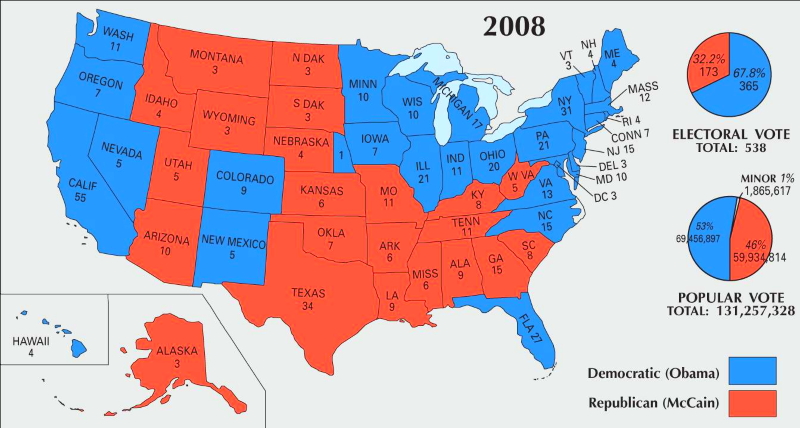
The results of the 2008 presidential
election
The presidential campaign
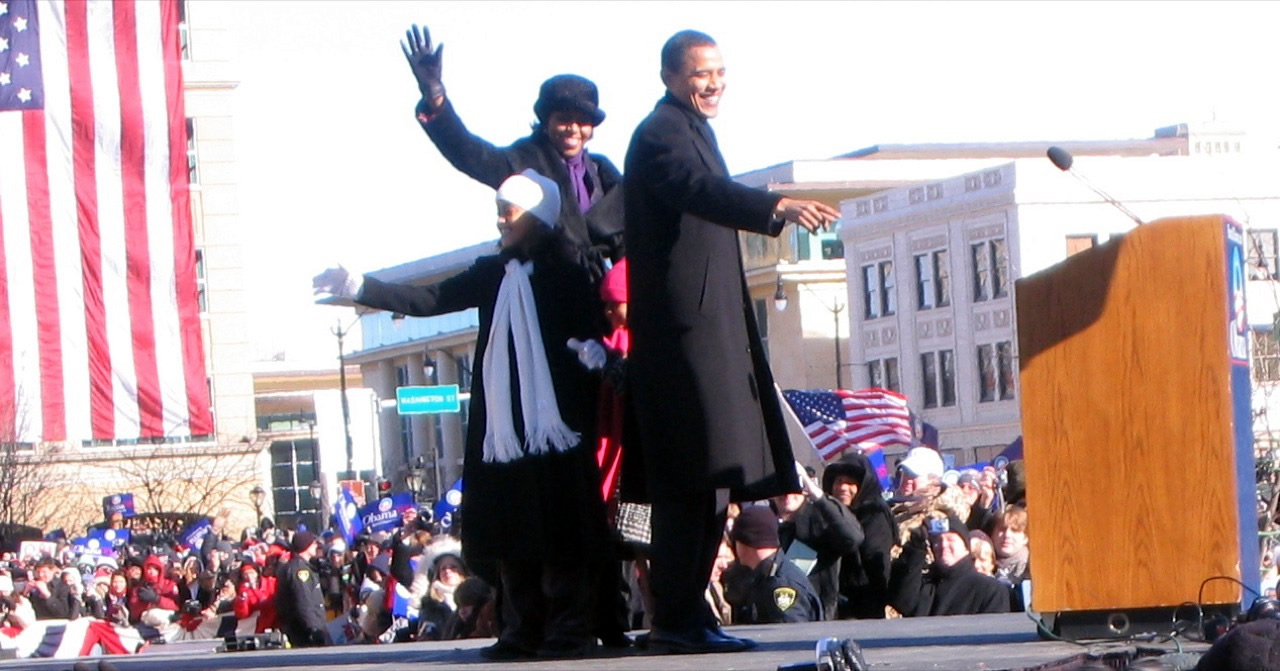
Obama stands on stage with
his wife and two daughters
just before announcing his
presidential candidacy in Springfield, Illinois, Feb. 10, 2007
Oprah promoting Obama in
the Iowa primaries – December 2007
Barack Obama speaking at
a campaign rally in Abington, PA
Barack Obama and Michelle Obama – 2008
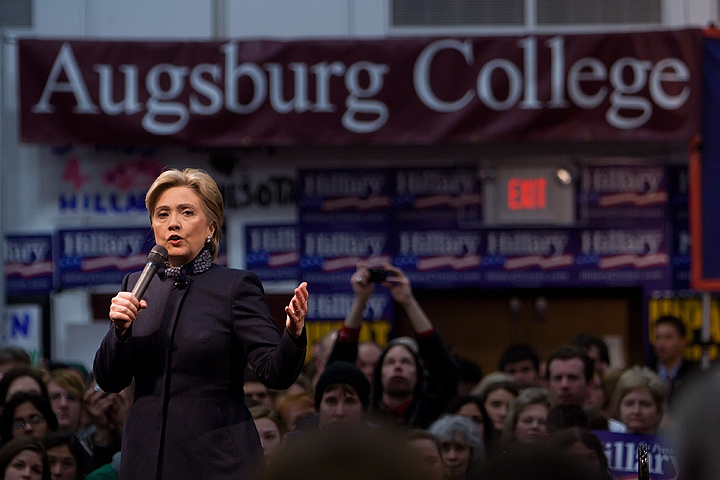
Hillary Clinton campaigning hard for the Democratic nomination – February 3, 2008
Hillary Clinton campaigning
at the Democratic National Convention – August 26, 2008
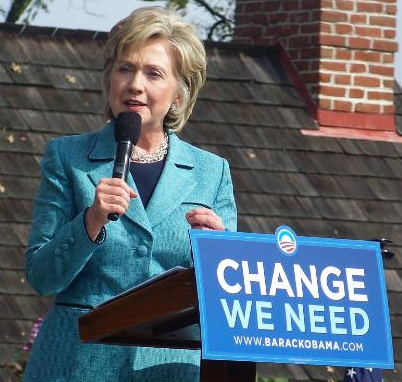
Having lost the nomination to Obama, Hillary campaigns for Obama – 13 October 2008
John McCain
Sarah Palin in Dover, New
Hampshire, October 2008
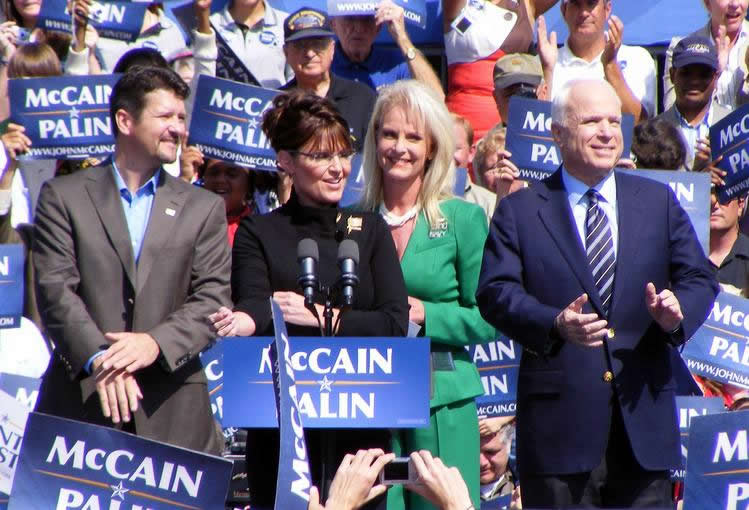
The Palins and McCains campaigning
in Fairfax, Virginia, September 2008
Obama delivers his presidential
election victory speech in Grant Park
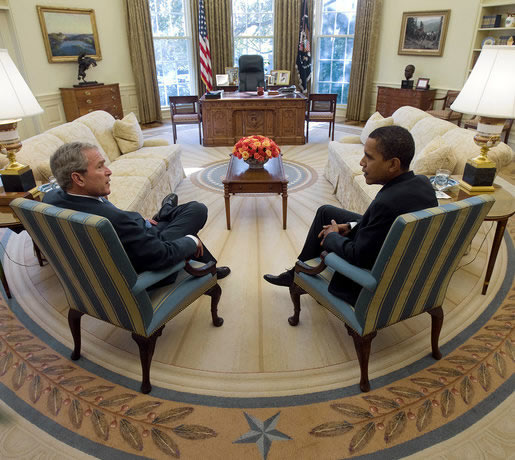
President Bush and President-Elect
Obama meet in the Oval Office
- Monday, Nov. 10, 2008
Barack Obama taking the oath
of office – January 20, 2009
Barack Obama taking the oath
of office on January 20, 2009 at the U.S. Capitol.
President Barack Obama and
first lady Michelle Obama wave to the crowds
lining Pennsylvania Avenue
during the 56th Inaugural parade, Washington, D.C., Jan. 20, 2009

|
|
"Generation X"
Just as McCain was typical of his "Silent" generation, so Barack Obama was typical of his, the Gen-Xers. And just what or who were/are the generation with this strange label? The term "Generation X" itself is a borrowing from earlier analyses of various social groups, in particular British youth of the Silent generation. But in America this term came to be applied to those who came after the Boomers, to Americans born from the early 1960s to the early 1980s (Obama was born in 1961, at the very beginning of the Gen-X generation, just as Bill Clinton and George Bush Jr were both born at the very beginning of their Boomer generation, in 1946). The "X" part referred to the way in which this generation had no particular ideals, no particular heroes (though something of a fascination with media celebrities), and no particular sense that their lives were going anywhere special. In general, they were content to merely "fit in," to find an acceptably comfortable place in the scheme of things, and a bit concerned that this might not happen. Ethnically, religiously, morally they had not any particularly characteristic standards, unless one considers this lack of standards itself a key standard of the Gen-X generation. They were, in short, quite accommodating of almost anything, as long as it did not get in their way of finding a comfortable place in society. This lack of distinct standards, distinct visions derives in great part to the lack of very inspiring family origins. Gen-Xers were typically children of Boomers, who had a very casual sense of loyalty to the idea of family itself. In short, a great number of the Gen-Xers were raised by single parents, typically single moms who worked hard to keep life moving forward. Male heroics did not generally play the traditional role in the formation and life of Gen-Xers, especially as fathers were rather marginal in the growing up of many of them. Gen-X males loved their mothers but looked more to their peers than anyone else to set whatever standards that they tried to live by. These standards, of course, were trendy and fluid, and tended to be shaped more by celebrity standards, which they followed with great interest, than by any sense of family heritage. This was also the first of the "wired" generation who found that their world was as much a virtual world as it was the actual physical world around them. Lacking strong, lofty male role models, Gen-X found itself easily sympathetic to feminism and homosexuality, helping to undercut the older traditional male-led culture. Indeed, and sadly, especially among minorities, male energy seemed to be relatively lacking. But this was also increasingly true across the entire cultural spectrum, which is one of the key reasons why Gen-X women started to outnumber greatly Gen-X men entering colleges and universities in the 1980s and the lower ranks of the professions in the 1990s. Bi-racial origins Barack Obama was born in 1961 to a White
Kansas girl, Ann Dunham, actually a Silent rather than a Boomer, a
typically enthusiastic Kennedy idealist. His father was also "Barack
Obama," a Black Luo tribesman from Kenya, who married Ann after getting
her pregnant. Both were students at the University of Hawaii, although
his mother moved during the next year to the State of Washington with
her son Barry (he would take the name of his African father, Barak,
only later in his development) soon after he was born. His father (who
was also married to a woman back in Kenya) left Hawaii the following
year (1962) to study at Harvard. The couple would eventually divorce
(1964) as his father returned to Kenya. Young Barry would see his
father only once more, very briefly in 1971 when he was age ten.3 His mother went on to marry again in 1964, Lolo Soetoro, an Indonesian student at the University of Hawaii, a Muslim, but one with rather Western attitudes (excellent tennis player, and very pleasant company at parties with alcohol) – at least as long as he was in the States. Then the young family moved to Indonesia in 1967 when Barry was six years old, his step-father working with American companies (the oil industry) as a liaison with the Indonesian political world. Barry would attend a Catholic school in Indonesia for three years, before entering a prestigious "public" school, where he would also study Islam. But apparently both Catholicism and Islam were for Barry mere curiosities rather than serious sources of personal identity (his mother was neither Catholic nor Muslim, though "spiritual" in a rather non-specific way). In fact, his own cultural (and racial) identity would always be a deeply challenging but also highly confusing matter for the boy. Meanwhile his step-father took on a more Muslim quality in Indonesia, expecting Barry's mother to play the role of a submissive Muslim wife. That simply was not going to happen. Things got tense (the two would divorce in 1980). However, in 1971, Barry was sent back to Hawaii to live with his maternal grandparents – and his mother and his younger sister Maya would join him the next year, in order for his mother to be able to complete her doctoral dissertation. That first fall back in Hawaii Barry was able to enter the highly prestigious Punahou School (5th grade), thanks to a scholarship and the earnings of Barry's hard-working grandmother (his grandfather was "retired"). In 1975 his mother and sister returned to Indonesia, but Barry would remain at Punahou until he graduated in 1979 (by that time he had dropped the name "Barry" and taken on his father's more exotic African name "Barack"). His mixed parentage caused some identity problems at Punahou, and probably contributed to his teenage venture into alcohol and drugs. But in general, Hawaiian society was itself a blend of different races and therefore more accepting of Barack's multi-racial, multi-cultural character. Also he found himself growing up without any strong male role models to help him shape his own life. All the major influences in his personal development were very strong-willed women (that category would also come to include his future wife, Michelle). And his picture of family life was very blurry ... not untypical of multitudes of other Gen-Xers. Professional education After graduation from high school, Obama
attended Occidental College in Los Angeles, but was able to transfer
two years later to the much more prestigious Columbia University in New
York City, where he majored in political science (international
emphasis). With the Columbia campus so close to the culturally Black
Harlem, Obama soon discovered a culture that seemed much easier for him
to find a natural place. He would attend Christian worship services
there, finding especially the music speaking to his heart. Thus Barack,
despite his White mother and White grandparents that he had grown up
with, now more easily identified himself as "Black."4 In 1983 he graduated from Columbia with a B.A. and went to work for a year for the Business International Corporation, a company helping businesses invest and operate abroad. He found corporate work uninspiring, and left to go to work for the Ralph-Nader-inspired New York Public Interest Research Group, a college-campus-based political activist organization. Then in 1985 he moved to Chicago to work for the next three years as director of the Developing Communities Project (a Catholic community organization) in the Black section of South Chicago. Here he found his purpose in life in directing job training, college-prep tutoring, tenant-rights programs, etc. Here he also came to understand the importance of society's legal dynamics as key to social development. Thus in the fall of 1988, at age twenty-seven, he entered Harvard Law School, and became a very focused, hard-working law student. Indeed, at the end of the year he was elected as an editor of The Harvard Law Review. The next year he was even elected president and editor-in-chief of the Review. During the next summers he returned to Chicago to intern as a summer associate with the law firms Sidley Austin (1989) and Hopkins & Sutter (1990). During the summer of 1989, while interning at Sidley Austin he met the very serious, very talented Michelle Robinson, a Princeton University (1983) and Harvard Law School (1988) grad, who had joined the firm the previous year. She was assigned as his adviser, and by the end of the summer they were dating. They would marry in October of 1992. Community development and the law In 1991 he graduated from Harvard Law School magna cum laude (with high honors) and returned to Chicago to take a two-year position as Visiting Law and Government Fellow at the University of Chicago Law School. Here he worked on his first book (published in 1995 as Dreams from My Father), a personal memoir about growing up bi-racial.182 During this time, he directed a massive voter-registration drive to get unregistered Blacks on the voting lists, gaining him political attention nationally as well as locally. In 1993 he went to work as an associate attorney for Davis, Miner, Barnhill and Galland, specializing in civil rights legislation and neighborhood economic development, promoted as counsel in 1996, serving in that capacity until 2002. During this time he also served on the board of directors for the Woods Fund of Chicago (community development), the Joyce Foundation and the Chicago Annenberg Challenge (serving the last-named also as chairman, 1995-1999). Also during this time, he continued to teach at the University of Chicago Law School (Lecturer 1992-1996 and Senior Lecturer 1996-2004), his field being constitutional law. The death of his mother In the meantime, his mother, who was living and working in Indonesia as a community development organizer for various funding agencies (including the U.S. Agency for International Development and the Ford Foundation), became sick and had to return to the States in early 1995, where she was diagnosed with uterine cancer. She died that same November, leaving Obama shaken about the experience of watching his mother not only struggle with the disease, but also with all the paperwork and personal hassle to get medical insurance coverage for doctor and hospital expenses. Illinois State Senator In 1996 Obama was elected to complete a vacated term in the Illinois Senate, representing the Illinois 13th district (Chicago South Side). As senator he was active in sponsoring or supporting a wide number of anti-poverty programs. He was re-elected senator in 1998 and again in 2002. Meanwhile in 2000 he entered the Democratic primary for the U.S. House of Representatives but lost rather substantially. But he then undertook a poll to see what his chances were in the U.S. Senate race coming up in 2004. In January 2003 he announced his candidacy for the U.S. Senate. At the same time, when the Democrats took control of the State House in January of 2003, Obama became chairman of the Illinois Senate's Health and Human Services Committee and sponsored legislation monitoring police actions to ensure a lack of racial profiling. U.S. Senator In the 2004 Democratic Party primary elections Obama won a landslide victory for party candidacy for the U.S. Senate, earning him considerable national attention. During that July he was called on to deliver the keynote address of the 2004 Democratic National Convention in Boston, gaining him even greater national attention. Meanwhile the Republican Party's U.S. Senate candidate resigned in June over a sex scandal, throwing considerable confusion into the Republican Party's campaign for U.S. Senate. In the November elections of that year (2004) Obama won the U.S. Senate seat with 70 percent of the vote. Obama took office as U.S. Senator in January 2005 and was assigned to the Senate Foreign Relations, Environment and Public Works, and Veterans Affairs Committees, but in early 2007 he left the Environment and Public Works Committee in order to join the Health, Education, Labor and Pensions Committee and the Homeland Security and Governmental Affairs Committee. He became chairman (that was fast!) of the Senate Foreign Relations subcommittee on European Affairs, and traveled to Eastern Europe, the Middle East, Central Asia and Africa. The Oprah Winfrey presidential endorsement In September 2006 Oprah Winfrey, the most-watched and most-influential woman commentator (topping Time and CNN lists of the most influential women in the world), endorsed Obama for president before he was even a declared candidate. The next month (October) she interviewed Obama and his wife Michelle on her show and repeated her previous endorsement. This also pushed his book, The Audacity of Hope, to #1 position on both the New York Times' and Amazon.com's best-seller list. This was followed by two more Oprah endorsements in 2007 (May and December), helping substantially to advance Obama in his effort to gain the Democratic Party's presidential candidacy. The presidential campaign In February 2007 Obama formally announced his candidacy for presidency. Over the course of that year the Democratic Party field quickly narrowed down to Obama, Senator Hillary Clinton (New York) and former Senator John Edwards (North Carolina). But in early 2008, following the allegations that Roberts was having an extra-marital affair (which turned out to be true), Roberts withdrew from the race, leaving Obama and Clinton facing each other. And slowly but relentlessly Obama pulled ahead of Clinton in the early part of 2008 – and in June, Clinton officially dropped out of the race. Confronting campaign controversy The campaign trail had some critical moments, especially during the early months of 2008. Obama's opponents picked up quickly on a comment he made in April in a speech to a very supportive audience in San Francisco about "You go into some of these small towns in Pennsylvania, they get bitter, they cling to guns or religion or antipathy toward people who aren't like them..." Actually the larger context of his speech was that his campaign workers should not be put off by the difficulties they were having reaching White workers bitter that their economic fortunes had stalled over the last 25 years, that they must show these same people that Obama was going to look out for them too, even though these voters were skeptical about "a 46-year-old Black man named Barack Obama" [laughter]. Another comment that was picked up by Obama's opponents was actually made by his wife Michelle earlier in February when she told an audience "For the first time in my adult life, I am proud of my country because it feels like hope is finally making a comeback." She was obviously referring to the hope she had that with her husband as President things would improve in the country, not that for the first time in her life she was proud to be an American (which is how opponents portrayed the wording). She would learn what all participants in politics must learn: you must choose every word carefully because the press is listening closely and ready to make headlines on the smallest twist of your words. Another controversy broke forth in March
when an ABC news program produced racially explosive excerpts of a
sermon delivered by Obama's Chicago pastor of 20 years, the Reverend
Jeremiah Wright. Reverend Wright's highly charged comments in which he
repeatedly cursed America were a huge embarrassment to Obama, and
ultimately led to Obama's abandonment of the man who had been much like
a father to him for all those years. But it seemed also to have had a very sad secondary effect: since the end of the pastoral relationship with the Reverend Wright, Obama seemed unable to find another Christian to offer him pastoral counsel, preferring to keep his and his family's Christian faith private. This is unfortunate because not just in political matters but also even in spiritual matters, the President is a person of great significance to the nation. "Great Expectations" A question that surely ran through the minds of Americans as Obama took office in January of 2009 was "what kind of president would this relative newcomer to national politics be?" His campaign was clearly based on the doctrine of "change." But how much change and what kind of change would that be? He had never been very specific about what he meant by his plan to bring "change" to the country. Certainly the mess left behind by Bush, Jr., needed to be "changed." His brief record as a U.S. Senator definitely put him very far over to the furthest Left of the Left-wing congressional Democrats. He certainly was clearly a champion of minority rights. But as President would he be able to champion majority rights as well? Where exactly did his personal loyalties lie? Would he be able to bring the country back to some kind of renewed unity – or would he leave the country further divided than it already was? Was his "change" designed to unite (the most important duty of any social leader) or divide the country even more deeply – by favoring one side of the social division even more? Obama the Christian Attending Catholic School in Indonesia for three years as a child, Obama was certainly informed, in a Catholic manner, of the major features of the Christian faith. But of course, the Christian faith is not just a matter of theological information and liturgical habit, it is a decision to live life in a certain way. Actually, it seems that it was not until Obama's last two years in college at Columbia University that a true interest in the Christian faith began to stir in him. Certainly the cultural experience of church attendance in nearby Harlem helped begin his journey. But so also did a lot of personal philosophical/theological reading of works such as those of the ancient Augustine or the contemporary Reinhold Niebuhr (teaching at the Union Theological Seminary adjacent to Columbia). Then when he eventually went to work in South Chicago for a Christian (Catholic) community development organization, he found himself sharing his interest in this matter with the ministers of a number of Black churches in the area. He also was deeply impressed by the key role that these Black churches played in the effort to lift local community life towards higher goals, the same ones he was pursuing as community developer. He finally decided to put himself whole-heartedly into the Christian dynamic, by becoming a regular attender at the mega-church of the Reverend Jeremiah Wright. Ultimately, Wright's sermons touched deeply both the heart and the mind of young Obama. For the first time in his life he found in the Reverend Wright a male figure to shape himself by. Thus also, he found himself being drawn to this unfolding Christian world as "family," something that he had not experienced in a long time. This 20-year relationship would shape Obama deeply as a Christian. Thus Obama was indeed a Christian, a deeply committed Christian, living a Christian life shaped by one of Christianity's many different cultural perspectives, of which America has always had many. But America's religious diversity raised an important question, of how basically Obama's near and dear Black Christianity would find a place in a largely White world. This would be a challenge that, entering the White House, Obama would have to have to carefully make his way through. Where exactly in that broad Christian spectrum would he, as president, ultimately place himself? 3The senior Barack Obama was killed in a car accident in Kenya in 1982. 4This
developmental pattern would follow lines similar to Gandhi's – who
after years of working hard to qualify himself as a member of the upper
strata of British Imperial society (law studies in London and years of
law practice in South Africa) finally found for himself a more
"natural" identity … by backing away from the effort to be a good
"Brit" and simply accepting the social status as mere "Indian." This in
turn would sharpen Gandhi's Indian identity to the point of being the
central social-cultural – and ultimately political – goal of his life:
to help other Indians find their proper identities quite apart from the
dominating influence of British Imperial society. Gandhi would dedicate
himself completely to "changing" (actually, "overthrowing") the
Imperial racial-cultural structure governing India. Likewise, Obama
would come to dedicate himself to the same mission of "change" in
America. Both Gandhi and Obama would succeed in their intense efforts
to enact such social change, each in his own way. Not surprisingly,
Gandhi was one of Obama's heroes, inspiring his own life greatly.
|
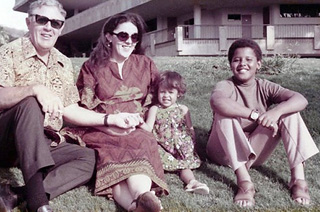
Ann Dunham with her father
and children
during Ann's brief stay
with her family in Hawaii during the mid-1970s.
Bishop Hall, on the campus
of Punahou School, in the background.
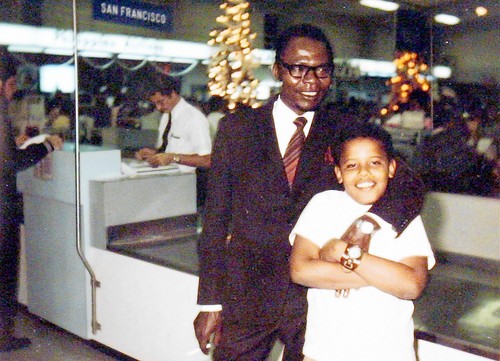
Barack Obama, Sr. with his
son Barack Obama, during his only visit to Hawai'i.
Barack Obama delivers the
keynote address at the 2004 Democratic National Convention in Boston
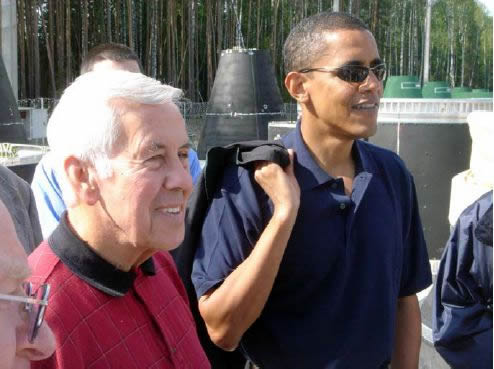
Senate Foreign Relations
Committee Chairman Richard Lugar and Committee member Barack
Obama at a base near
Perm, Russia (August 2005). This is where mobile launch
missiles are
being destroyed by the Nunn-Lugar
program.
2005 - Obama and his Chicago pastor of 20 years, Rev. Jeremiah Wright
Sadly, the reltionship would be broken when ABC broadcast racist selections
of Wright's sermons during Obama's presidential campaign in 2008...
and Wright went on to defend himself in even rougher terms – infuriating Obama

|
Joe Biden – Vice
President
Secretary of State Hillary
Rodham Clinton
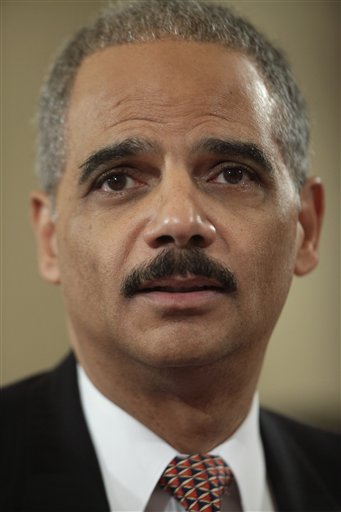
Attorney General Eric Holder
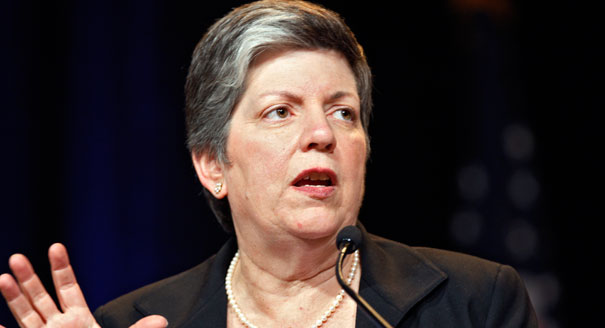
Janet Napolitano – Secretary
of the Department of Homeland Security
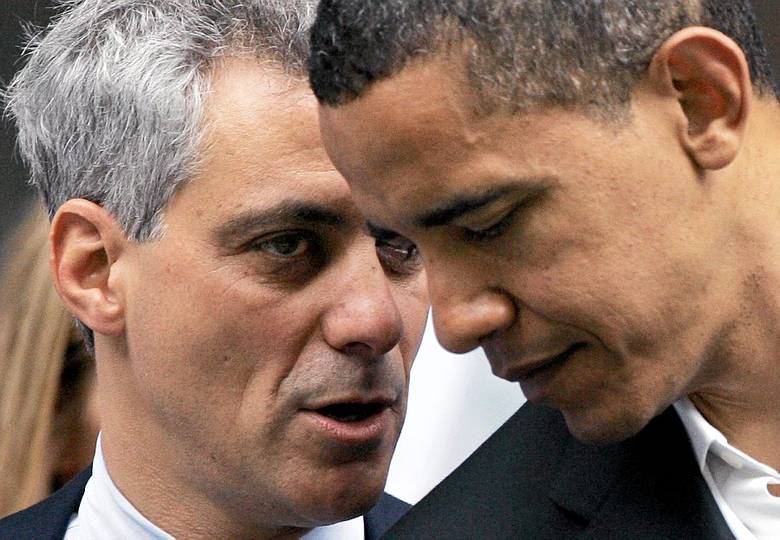
Rahm Emanuel – Obama's White House Chief of Staff
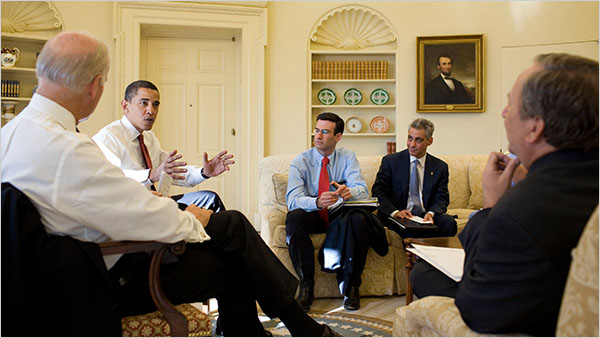
Barack Obama in oval office
with staff
From left: Vice President
Biden, President Obama, Budget Director Peter Orszag
and Chief of Staff Rahm
Emanuel in the oval office, January 2009
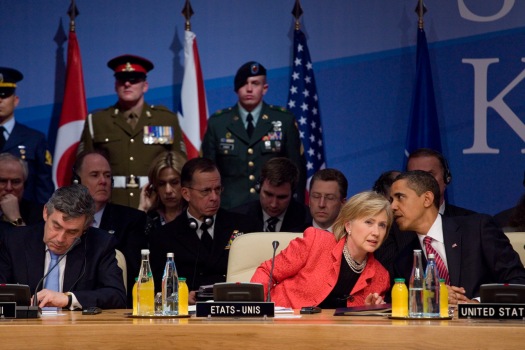
President Obama confers with
U.S.Secretary of State Hillary Clinton – April 4, 2009
during the NATO summit in
Strasbourg, France. British Prime Minister Gordon
Brown
is to Clinton's right while Chairman of the Joint Chiefs of Staff Michael Mullen
is between
Brown and Clinton.
The Obama Cabinet -
2009


 Miles
H. Hodges
Miles
H. Hodges